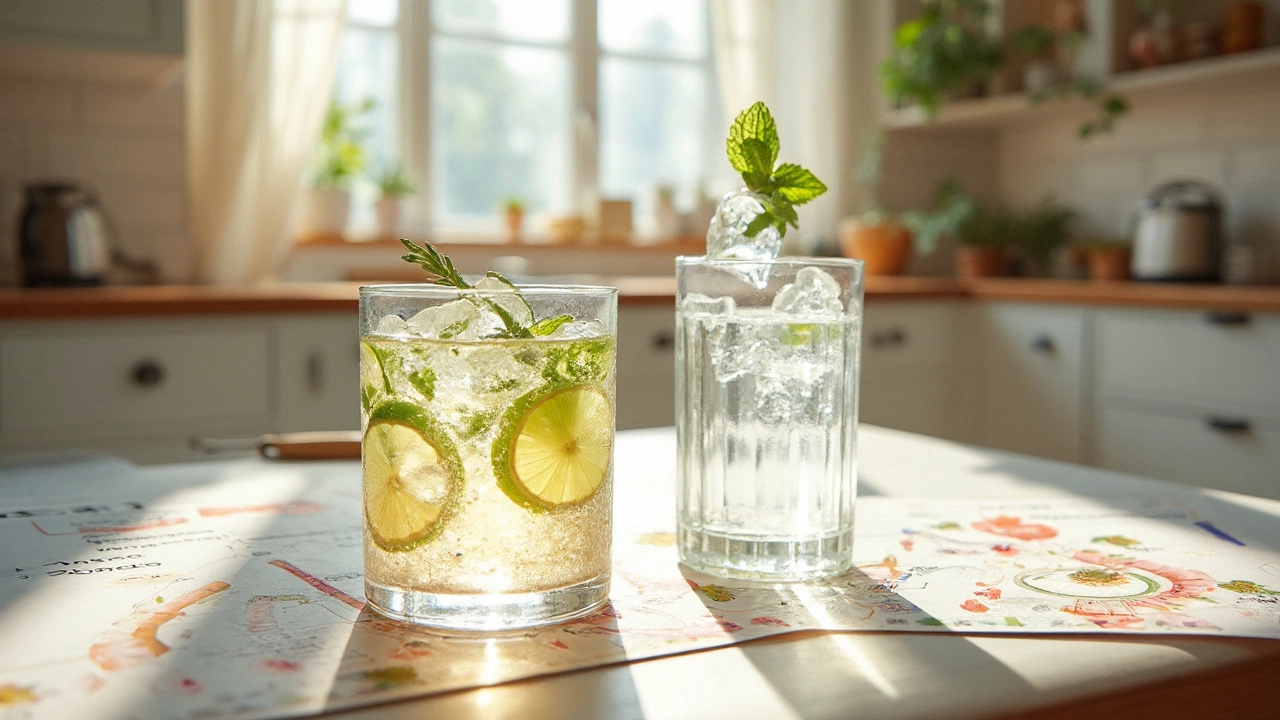If your stomach throws a fit after a night of drinking, you’re not alone. The battle between gin and vodka isn’t just about taste—it’s about how each one treats your gut. Maybe you’re heading out on a gin distillery tour soon and wondering if sampling gin is kinder to your stomach than hitting the vodka bar.
Both gin and vodka are considered “clean” spirits, but their impact isn’t exactly identical. Your gut deals with not just the alcohol, but also the extra ingredients swirling in your glass. Some people swear gin keeps things calmer, while others say vodka’s simplicity gives their digestive system a break.
The catch? It’s not only about the spirit itself. What you mix with it, how much you drink, and even the brand can change how your stomach reacts. Not all vodka is created equal, and not all gin is packed with the same botanicals. Let’s break down what’s really going on in that bottle—and what you can do to keep your stomach in check, wherever your tasting adventure takes you.
- What's Really in Your Glass?
- How Alcohol Hits Your Stomach
- Gin’s Botanicals: Helpful or Harmful?
- Vodka’s Clean Slate: Fact or Myth?
- Tips for Touring, Tasting, and No Regrets
What's Really in Your Glass?
Ever looked at your gin or vodka and wondered what you’re really drinking? Here’s a quick breakdown. Vodka is known for its clean, pretty much flavorless profile. It’s made by distilling fermented grains or potatoes multiple times, stripping out most impurities and flavors. In the EU, vodka has to be at least 37.5% alcohol by volume. Most brands aim for 40%.
Gin, on the other hand, starts the same way as vodka—a neutral spirit from grains. The magic happens when botanicals get added, with juniper berries always involved (otherwise, it’s not gin). Distillers often throw in extra herbs, roots, or citrus peels to create unique flavors. Some gins go all out, including anywhere from 5 to over 30 botanical ingredients. That’s a big difference in what your stomach is processing, compared to the near-blank slate of vodka.
Here’s what you usually get in your glass:
- Gin: Alcohol, juniper, extra botanicals (like coriander, angelica root, citrus), water
- Vodka: Alcohol, water, and sometimes a touch of flavoring (but usually nothing else)
If you’re sensitive, it’s worth checking the label or even asking at the distillery about what botanicals the gin contains. Some people react to certain herbs or peels—think citrus allergies or issues with strong spices. With vodka, it’s more about the base—some say potato vodkas feel easier on their stomach than those made from wheat or rye.
Bottom line: one drink is all about pure alcohol and water; the other brings in an army of botanicals, which could be a game changer for your gut. That’s worth remembering before your next distillery tour or cocktail experiment.
How Alcohol Hits Your Stomach
Downing a shot of gin or vodka might feel the same at first, but your stomach knows the difference almost right away. When you drink alcohol, it slides down your esophagus and lands in your stomach, where it starts doing its thing within about five minutes. Unlike food, alcohol doesn’t need to be broken down much before it gets into your blood. It actually starts absorbing straight through your stomach lining. That’s why those first few sips can hit fast if you drink on an empty stomach.
Now, about the burn you sometimes get—alcohol increases acid production in your stomach. This extra acid can give you heartburn or make you feel queasy. People with acid reflux or sensitive stomachs notice this more. Spirits like vodka and gin have high alcohol content (usually around 40%), so if you drink them neat, the impact is even stronger than with beer or wine.
Another thing: alcohol slows down how quickly your stomach empties. That means your stomach sits with its contents for longer, which can make you feel bloated or even a bit nauseous. If you already have stomach issues, alcohol makes them worse for most people.
Here are a few things that make a big difference when drinking vodka or gin:
- If you add acidic mixers (like tonic or citrus juices), expect more irritation.
- Chugging on an empty stomach is a bad idea—eat something first so your body absorbs the alcohol slower.
- Quality matters—a cheap bottle will probably have more impurities that can upset your gut.
The short story: both gin and vodka hit your system fast and can irritate your stomach, especially if you overdo it or skip meals. The way your drink is mixed and how much you drink has just as much effect as the spirit you choose.

Gin’s Botanicals: Helpful or Harmful?
When you drink gin, you’re getting more than just alcohol—you’re also getting a mix of botanicals. Juniper berries, which give gin its signature kick, are famous for their earthy, piney taste. But there’s a lot more tossed into the pot, depending on the brand. Most gins throw in coriander, angelica root, citrus peels, and sometimes even weird stuff like pepper or licorice. This mix is what makes gin stand out from vodka. But does all this botanical business mess with your stomach?
Here’s where things get interesting: some of these plants have been used in folk medicine for centuries. Juniper, for example, was once a go-to remedy for bloating. Coriander and citrus peel are known to calm the gut in small amounts. But nobody’s drinking gin as a health tonic—let’s not kid ourselves. Sometimes, extra ingredients can backfire, especially if you’ve got a sensitive belly or allergies. For a few unlucky folks, botanicals can trigger heartburn or gut irritation.
If you have allergies to certain herbs or spices, gin can sneakily set off an upset stomach or worse. Also, if you’re on certain meds, botanicals in gin might mess with how your body processes drugs, especially those for blood pressure or heart conditions. Always worth a check with your doc if you’re not sure.
- People with acid reflux sometimes find gin rougher than vodka because of the botanicals.
- If you’re prone to migraines, certain gin brands may trigger headaches due to specific botanicals.
- Craft gins—which are popular on distillery tours—often use unique ingredients, so always ask for details if you’re sensitive to new stuff.
To put it in perspective:
| Common Gin Botanical | Benefit | Possible Drawback |
|---|---|---|
| Juniper | Digestive support, mild diuretic | Can irritate if over-consumed |
| Coriander | Soothes gut (in small doses) | Rare allergies |
| Citrus peel | Helps digestion, adds flavor | Possible acid reflux trigger |
| Angelica root | Traditional gut remedy | Can cause issues if allergic |
The simple truth? If you know you’re fine with herbs and spices, gin’s botanicals probably won’t bother you. If you get heartburn after a fancy gin cocktail, try switching brands or asking for a more basic gin. And if your gut’s especially touchy, it might be worth sticking with something a bit plainer—or at least checking the label before you take that first sip of gin.
Vodka’s Clean Slate: Fact or Myth?
People love to call vodka the “cleanest” spirit. The main reason? Good vodka is basically just water and ethanol—with almost nothing else hanging around. It’s all about that super-distilled, filtered process that strips away extras you’d find in other drinks. But does this really mean your stomach is off the hook?
Quality matters. Cheap vodka might not be as pure as you think. Lower-quality brands can contain small traces of fusel oils, leftover sugars, and other byproducts that didn’t get filtered out. Sometimes, these extras can bump up your chance of getting an upset stomach or a nasty hangover.
| Vodka Factor | High-Quality Vodka | Low-Quality Vodka |
|---|---|---|
| Distillation cycles | 3 to 7 times | 1 to 2 times |
| Filtration | Charcoal or other advanced | Basic or none |
| Additives | Very few or none | Possible flavorings/sweeteners |
| Sugar Content | <0.5g/L | Up to 2g/L |
Here’s the kicker: even the cleanest vodka is still straight-up alcohol. Drinking a lot—no matter how clean—can still mess with your stomach lining, slow your digestion, and trigger those classic booze belly problems. Some people with sensitive guts notice less irritation with vodka, but don't count on a totally smooth ride. Your body’s tolerance, how much food you’ve eaten, and what you mix it with all play a role.
- If you’re keen on less stomach drama, pick premium brands that brag about their filtration and distillation steps.
- Look for vodkas with no added sugar or artificial flavors. Less junk means less for your gut to handle.
- Mix with plain soda or water instead of sugary juices if you want to keep things light.
The bottom line—vodka can be easier on your stomach compared to spirits loaded with extras, but “clean” doesn’t mean zero consequences. Treat your stomach kindly by going for high-quality vodka and keeping your pours reasonable.

Tips for Touring, Tasting, and No Regrets
Distillery tours shouldn’t be stomach-wrenching—not during, and definitely not after. Whether you’re team gin or loyal to vodka, there are a few things you can do to keep your gut happy as you taste your way through small-batch spirits.
Start by eating a good meal beforehand. An empty stomach is a bad idea; alcohol absorbs faster, and your body takes a bigger hit. Experts say proteins and healthy fats are best for slowing that alcohol spike. Avoid spicy or greasy food right before—you don’t want extra hurdles for your digestion.
- Hydrate before, during, and after the tour—alcohol dehydrates, and dry guts are cranky guts.
- Pace yourself: Try spacing out tastings, and don’t down the sampler set just because it’s there.
- Avoid sugary mixers, which can mess with digestion and make hangovers worse. If you’re offered tonic or juice, think about sticking with soda water.
- Some distilleries offer snacks—go for bland options like crackers or nuts over spicy or rich cheeses.
- Listen to your body, not peer pressure. If something feels off, slow down or take a break.
Check out this quick breakdown of what people say about gin and vodka on the stomach, gathered from recent guest surveys at major UK distilleries:
| Distillery | Spirit Sampled | % Reported No Stomach Issues | % Reported Mild Discomfort |
|---|---|---|---|
| Bombay Sapphire (Gin) | Gin | 73% | 18% |
| Beefeater (Gin) | Gin | 68% | 22% |
| Chase Distillery (Vodka) | Vodka | 75% | 16% |
| Belvedere Tasting Room | Vodka | 71% | 20% |
Notice how the numbers are close? It’s not a magic answer—everyone’s body reacts differently. Small-batch and high-quality spirits from real distilleries usually have fewer impurities, which can mean less stomach drama than the cheapest bottle from the supermarket.
If you want to try both gin and vodka on the same tour, start with the one you think is easier on your stomach and finish with lighter, less botanical-heavy samples. And most tours will let you sip smaller portions or even skip certain tastings—don’t be shy about asking.
Nobody wants to end a fun outing clutching their stomach. Keep these tips in mind, and you’ll get the most out of your gin or vodka adventure—minus the regrets.


